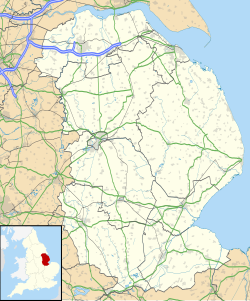RAF Kirmington
| RAF Kirmington | |||||||||||
|---|---|---|---|---|---|---|---|---|---|---|---|
| Kirmington, Lincolnshire in England | |||||||||||
 Humberside International Airport | |||||||||||
| Coordinates | 53°34′40″N 000°20′39″W / 53.57778°N 0.34417°W | ||||||||||
| Type | Royal Air Force satellite station 13 Base substation 1943-46 | ||||||||||
| Code | KG[1] | ||||||||||
| Site information | |||||||||||
| Owner | Air Ministry | ||||||||||
| Operator | Royal Air Force | ||||||||||
| Controlled by | RAF Bomber Command * No. 1 Group RAF | ||||||||||
| Site history | |||||||||||
| Built | 1942 | ||||||||||
| In use | October 1942 - 1953 | ||||||||||
| Battles/wars | European theatre of World War II | ||||||||||
| Airfield information | |||||||||||
| Identifiers | IATA: HUY, ICAO: EGNJ | ||||||||||
| Elevation | 26 metres (85 ft)[1] AMSL | ||||||||||
| |||||||||||
Royal Air Force Kirmington or more simply RAF Kirmington is a former Royal Air Force satellite station located 6.2 miles (10.0 km) north east of Brigg, Lincolnshire and 11 miles (18 km) south west of Grimsby, Lincolnshire, England.
History
Second World War
It took its name from the village of Kirmington nearby; the most notable squadron posted there was No. 166 Squadron RAF[2] and a memorial plaque to the members of that unit is in the parish church. The airfield opened in January 1942 [3]
| Squadron | Equipment | From | To | Notes |
|---|---|---|---|---|
| No. 142 Squadron RAF | Vickers Wellington III/X | 19 December 1942 | 19 December 1942 | Disbanded[4] |
| No. 150 Squadron RAF | Wellington IC and III | October 1942 | 19 December 1942 | Blida, Algeria[5] |
| No. 153 Squadron RAF | Avro Lancaster BI/BIII | 7 October 1944 | 15 October 1944 | RAF Scampton Reformed here.[6] |
| No. 166 Squadron RAF | Wellington III/X | 27 January 1943 | February 1943 | Disbanded[7] |
| Lancaster BI/BIII | September 1943 | 18 November 1945 | Disbanded[7] |
The site was also used by No. 15 (Pilots) Advanced Flying Unit as a Relief Landing Ground between March and October 1942.[8]
Post 1945
From February 1946 the station was put on care and maintenance until relinquished by the Air Ministry to the Ministry of Agriculture in 1953.[9]
Current use
In 1970, after changing hands several times, Kirmington was selected as the best location for a regional airport serving the Hull, Grimsby and Scunthorpe localities and has become Humberside Airport.[9]
References

Citations
- ^ a b Falconer 2012, p. 122.
- ^ Halpenny 1981, p. 120.
- ^ Lincolnshire Airfields in the 2nd World War - p152 - Patrick Otter - Countryside Books - 1996 - ISBN 978 1 85306 424 1
- ^ Jefford 1988, p. 61.
- ^ Jefford 1988, p. 62.
- ^ Jefford 1988, p. 63.
- ^ a b Jefford 1988, p. 64.
- ^ Sturtivant & Hamlin 2007, p. 34.
- ^ a b Halpenny 1981, p. 121.
Bibliography
- Falconer, Jonathan (2012). RAF Airfields of World War 2. UK: Ian Allan Publishing. ISBN 978-1-85780-349-5.
- Halpenny, B.B. Action Stations: Wartime Military Airfields of Lincolnshire and the East Midlands v. 2. Cambridge, Cambridgeshire, Patrick Stephens Ltd, 1981. ISBN 0-85059-484-7.
- Jefford, C.G. RAF Squadrons, a Comprehensive Record of the Movement and Equipment of all RAF Squadrons and their Antecedents since 1912. Shrewsbury, Shropshire, UK: Airlife Publishing, 1988. ISBN 1-84037-141-2.
- Sturtivant, Ray; Hamlin, John (2007). Royal Air Force flying training and support units since 1912. Tonbridge, UK: Air-Britain (Historians). ISBN 978-0851-3036-59.



